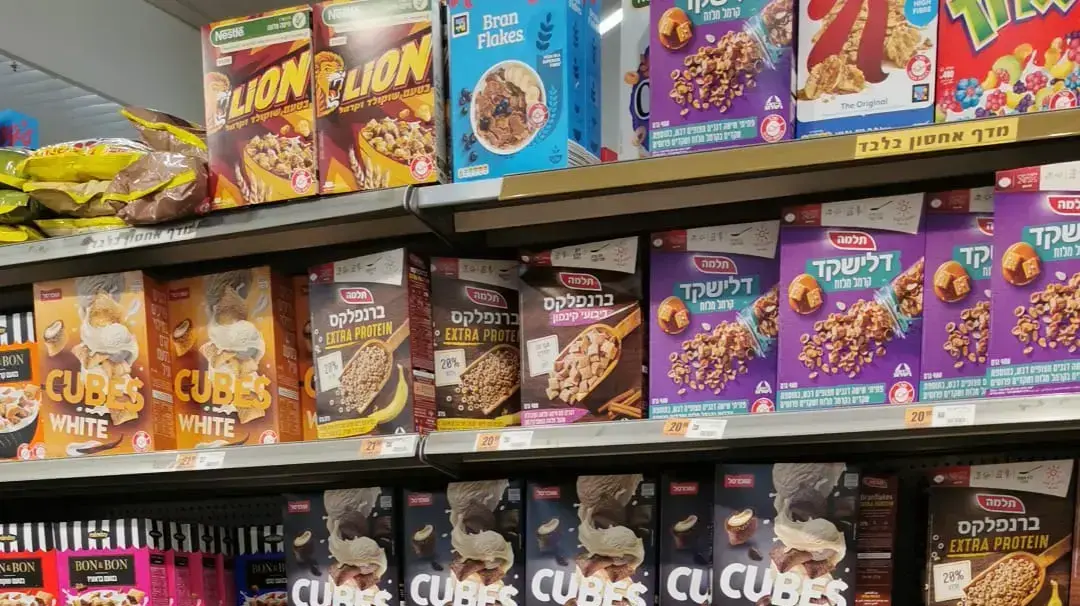Ashbol's products push Unilever's well-known brands off the shelves at the Shoppersal Deal branch, but what will happen the day after? (Photo: Lior Zucker)
The Unilever company, which owns the brands we grew up with - from Thelma mayonnaise to Alofis cornflakes - does not exactly treat the Israeli market with the respect it deserves.
True, we are a small market with a lot of noise, but after all the company occupies a 4% market share in FMCG sales in Israel, which means a significant market share.
Why a big noise?
Take for example the case of Ben & Jerry's ice creams, which are owned by the international corporation but are produced in Israel.
The decision not to distribute the ice cream in the areas beyond the green line and the sanctions on behalf of public organizations against the decision - which affected Unilever's share in the world, made it clear to them how complex the Israeli market could be.
Now the war is over the price increase which on the face of it seems illogical.
Many retail chains are reducing Unilever's shelf space, following the non-approval of the price increase, but at the same time, the retailer, who loses a part of his transaction turnover as a result of the move, needs to find a way to generate profits in other channels.
The cereal shelves in the marketing chains have been decorated with weakened brands and private brands, local manufacturers such as the "Ashbol" company, which produces, among other things, cereal under the "Multi" brand, has gained a jump in market shares in the last month, following increased exposure on the shelves by the retailers, who are forced to provide us with a solution to the lack of the well-known brand .
For example, Unilever's Kokoman Thelma breakfast cereal weighing 375 grams is priced at an average price of NIS 21.90 per consumer, while a substitute product of Ashbol 420 grams is priced at an average price of NIS 9.50 per consumer.
Replacement products in the Rami Levy network.
In the meantime, the small producers gain exposure (Photo: Lior Zucker)
The gap is huge, but the question is what will happen here after the storm.
Lior Zucker, Ashbul's VP of Sales
,
is optimistic: "Finally the consumer has alternative solutions at significantly lower prices - and if this strategy continues and changes the culture on the sales floor, it will be a significant change for all the small food producers in the Israeli economy and for consumers."
The Cereals We recognize an onslaught on breakfast cereals by private brands, cereals by unknown brands and even "Post" cereals, an international brand that did not capture proper market shares in Israel, succeed in expanding and occupying shelf space at the expense of Unilever brands.
But not only the small ones are getting stronger, but also bigger players , such as Asem which owns Nestlé's breakfast cereal brands such as Trix, Cheerios and Fitness, Diplomat Company with the international brand Kellogg's. These are not unknown names, but until recently Thelma/Unilever's breakfast cereal was the strongest and most stable.
So is our consumer culture changing?
It's too early to tell, mainly because the issue is complex.
For example, we are used to it being more difficult to change the consumption patterns of an older person, who has shown loyalty to a certain brand for years, but in the field of breakfast cereals, for example, it turns out that the brand loyalty of children and teenagers is higher than that of their parents: while the latter will easily settle for a substitute, the younger ones maintain brand loyalty. the true".
Despite the report of a loss of sales amounting to NIS 2.4 million in the last month and according to Storenext data that indicate a decrease in Unilever sales, we still have not seen the real results.
Many consumers still prefer the expensive brands and some of the products the consumers keep full at home - so they have not yet reached the decision point between the familiar brand and the alternative.
One thing is certain, although in Israel it is very difficult to move the customer, the increased exposure to alternatives at least encourages experimentation - even if it does not develop into a long-term relationship.
For example, Thelma's mayonnaise continues to dominate the market (not only against outside competitors, but even against a domestic competitor such as Hellman's, which also belongs to Unilever).
Yes, we see that despite the appearance of new breakfast cereals on the shelves, Cornflakes of Champions and Pillows continue to be the best sellers in Israel.
We have already written: their loyal target audience, mostly children and teenagers, does not like their bowl of cornflakes being moved to an alternative channel.
More in Walla!
"This is how I found the solution to the knee pains that made my life miserable"
Submitted by Apostrophe
Not just on the cereal shelf.
The consumer landscape in the supermarket is changing.
How long?
Not clear (Photo: Lior Zucker)
Unilever is not only a player in breakfast cereals and mayonnaise, but owns many brands in many segments on the grocery store shelves and in everyone's pantries, the international brand Knorr that offers sauces, soups and cooking aids, the mayonnaise and sauces brand Hellmans, snacks and bread substitutes such as bagel products, Fatih and Kifli.
Unilever is also a significant player in laundry detergents with the Bedin brand, in detergents with the Sif brand and in the worlds of toiletries and perfumes with Dove, X, Rexona and Pinok products.
In some of these segments, many consumers manage to find substitutes for almost every brand: Assem's pretzels and crackers cater to the majority of customers who are loyal to Bagel Bagel, Snow's Maxima brand laundry products are a fair alternative (even if the average price is higher) and high loyalty is found mainly among consumers who are struggling to replace products such as shampoo, conditioner, shower lotion and more, to which they are accustomed.
The main problem with consumer wars of this kind is that it is easy to win a battle, but hard to win a campaign.
Therefore, the consumer must move from a passive position of one who is affected by the supply on the shelves, to one who aggressively demands cheaper substitutes.
Why?
Because after being exposed to a decrease in their sales volume, the marketing chains will flex against Unilever, after all - they also prefer high prices.
In the reconciliation that will be between Unilever and the retail chains, the consumer may still find himself in the role of the sheep - and the only way to prevent this is with the help of smart consumerism.
Very quickly they will find a new "villain" in the form of another company that will make its products more expensive - and the signal from the direction of the regulation is that you can celebrate, as long as there is no new government, they will forget the anger about Unilever and we will all go back to consuming and paying dearly.
This is how it is when the conformist consumer does not understand that the power is solely in his hands (for example explaining to the children at home that they no longer buy cornflakes for pillows - and not to give in to their desires to stick with the familiar taste).
And of course there is another side to this story: the small manufacturers and importers.
To those I suggest not to be impressed by the air of the peaks they are breathing right now.
Do not build on the current reality, friends - because the moment the retailers return to cooperate with Unilever, you may be pushed into the dark corner where you have had to wait until now.
The writer is the CEO of the Retail Research Institute
Of money
consumption
Tags
Unilever
Thelma
barn
Snow
Cost of living









